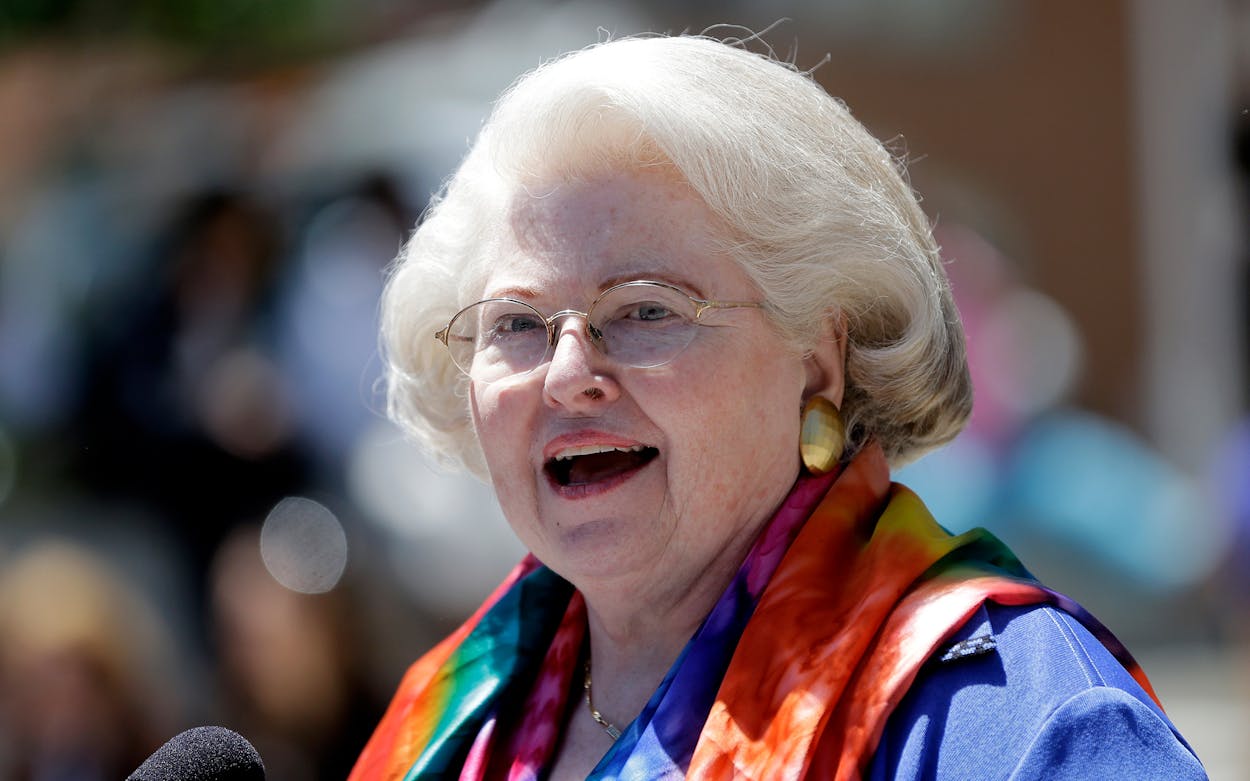Sarah Weddington was impossibly young, all of 26, when she argued before the U.S. Supreme Court in 1971 and 1972 that a woman had a right to privacy when it came to reproductive decisions. The choice to end a pregnancy, she contended, was nobody else’s business. This was a novel idea at the time, when abortion was illegal in Texas, except to save the life of the mother, and women couldn’t even get birth control unless they were married or certified that they were six weeks away from their wedding day. Certainly, there were no women on the Supreme Court—there wasn’t even a ladies’ room in the lawyers’ lounge. In his opening, the assistant attorney general of Texas, Jay Floyd, tried to win over Chief Justice Warren Burger with what came to be known as a famously boneheaded line: “Mr. Chief Justice and may it please the Court. It’s an old joke, but when a man argues against two beautiful ladies like this, they are going to have the last word.” He was right: Weddington and her partner Linda Coffee won the landmark the case for their client Jane Roe (later identified as Norma McCorvey) on a 7–2 vote, making abortion legal across the country.
Weddington was beautiful then, a true Texas babe in the parlance of the time, with blue eyes and a thick, seductive mane of blond hair that tumbled well below her shoulders. She had a lilt to her West Texas accent that probably made Floyd and many good ol’ boys even more dismissive. What he and others failed to understand was that Weddington, the daughter of a homemaker and a Methodist minister, had grown up in Abilene, riding horses under a limitless sky, and had developed a downright hostile relationship to anyone who applied the word “no” to her dreams. That singular characteristic explains how she got into law school at the University of Texas at Austin after her college counselor told her it would be too tough for her. “So of course, that was the moment I decided I was going to law school,” she later said.
Such determination helped her find alternatives when, not surprisingly, stellar grades did not help Weddington get a job at any of the law firms she applied to after graduation. The hiring committees, she would later say, believed women couldn’t do the job because they “had to be home to cook dinner.” So she went to work for the Texas Bar, drafting ethical standards, and had an open door when a group of women in Austin asked her how they might challenge the state’s abortion law. That same self-confidence also helped her survive the abortion Weddington got in Piedras Negras, Mexico, believing that a pregnancy would have derailed her legal education and her determination to put her husband through law school. “I will never forget following a man in a white guayabera shirt down an alley,” she told Texas Monthly writer Pamela Colloff in 2003. As Weddington continued her fight for women’s rights, she never let the growing file of hate mail stop her, either. She kept every note, she explained to Colloff, for a reason: “If anything ever happens to me, the police can check that file.”
She was, in a word, fearless, and continued to be so as a Texas legislator from 1973 to 1977—the first woman to represent Travis County in the state House—and subsequently in the Carter administration, first in the Department of Agriculture and later as an assistant to the president on women’s issues.
Weddington was for much of her life part of a coterie of outspoken Texas women who had grown up in a state that was, as the cliché went, hard on women and horses. That group included but certainly wasn’t limited to Barbara Jordan, Sissy Farenthold, Ann Richards, Molly Ivins, Liz Carpenter, and a host of others who were smart, clever, and perpetually pissed off about the limits placed on their talents, their abilities, and their dreams. They understood that until women had positions of power, they could never change the status quo, and so spent their lives, hands on hips, getting themselves and their kind into legislatures and law firms and back rooms where they could make a difference.
To a considerable extent, they succeeded in pulling Texas into the modern age, albeit kicking and screaming. But Weddington knew the limits of her power even then. As she told Colloff almost twenty years ago, “I am sure when my obituary is written, the lead paragraph will be about Roe v. Wade. I thought, over a period of time, that the right of a woman to make a decision about what she would do in a particular pregnancy would be accepted—that by this time, the thirtieth anniversary of Roe v. Wade, the controversy over abortion would have gradually faded away like the closing scenes of a movie and we could go on to other issues. I was wrong.”
So wrong. Weddington’s death at a time when a new Texas abortion law prevents women from exercising their constitutional right to safe, legal abortions is a grim reminder that the work never ends—that what Weddington and her peers did for younger generations came with no guarantees. What Weddington passed down was an obligation, not a promise.
- More About:
- Politics & Policy
- Abortion








